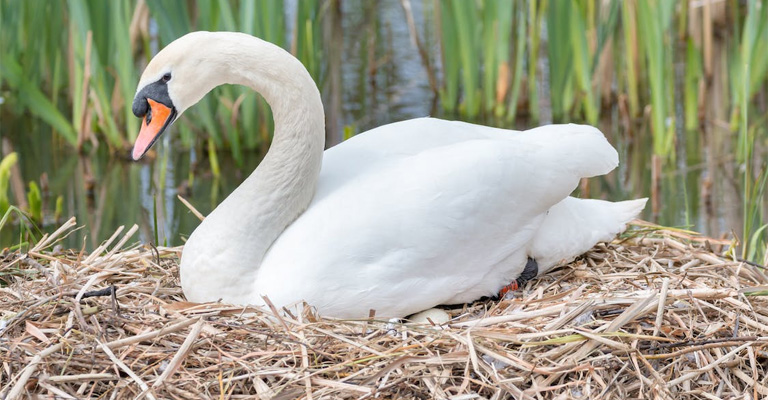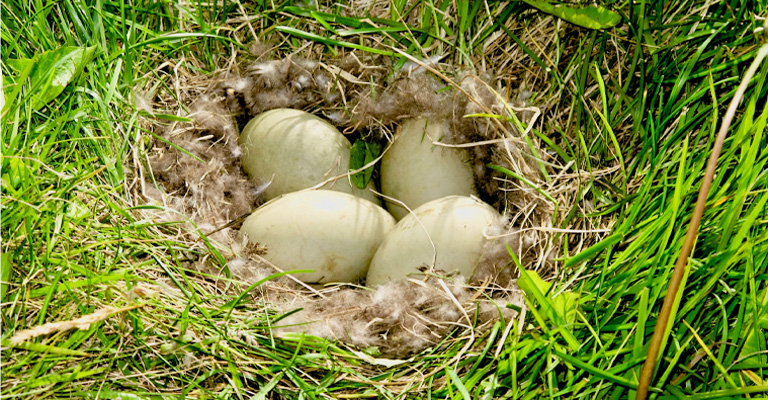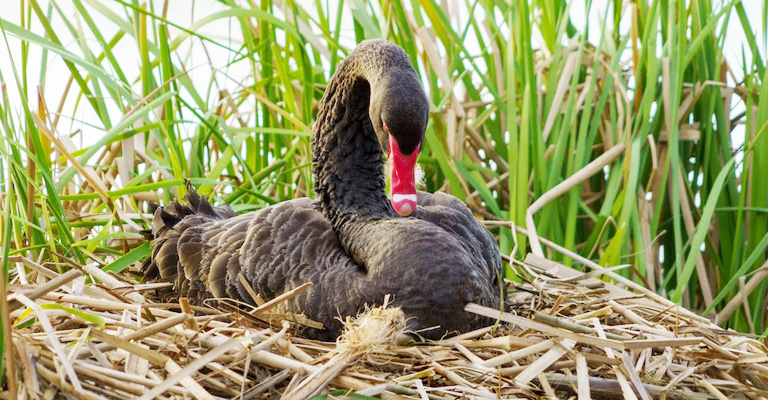The arrival of spring heralds the renewal of life in nature, and for many, it includes the delightful sight of duck nests nestled near ponds, rivers, or even in your backyard.
Protecting these nests is not just a matter of preserving nature’s beauty; it’s an essential responsibility to ensure the safety of these vulnerable creatures.
Ducks face numerous threats, from curious predators to human disturbances, which is why knowing how to protect a duck nest is crucial.
In this guide, we’ll explore effective ways to safeguard duck nests, allowing these feathered friends to raise their young in peace. Our tips will empower you to be a guardian of duck nests and support the fragile cycle of life that unfolds each spring.
Whether you’re a wildlife enthusiast, a landowner, or someone who simply wants to do their part in preserving biodiversity, these strategies will help you create a safe haven for nesting ducks.

How to Protect a Duck Nest?
Ducks often choose to nest in vulnerable locations, and they face various threats from predators, human disturbances, and environmental factors. Let’s explore the essential steps you can take to protect a duck nest effectively.
Nest Site Selection
Selecting the right nesting site is of paramount importance when it comes to protecting a duck nest. Ducks are inherently cautious and discerning in their choice of nesting locations, and as stewards of wildlife, it is our responsibility to honor and support their preferences.
Let’s delve deeper into the factors to consider when creating a safe haven for these magnificent waterfowl:
Privacy h4
Privacy is the cornerstone of a suitable duck nesting site. Ducks, much like humans, seek a tranquil and secluded spot where they can incubate their eggs and raise their ducklings without unnecessary disturbances.
When identifying a potential nesting site, consider its remoteness from human activity.
It should be away from bustling pedestrian traffic, curious pets, and potential disruptions that could startle or distress the nesting mother. Privacy not only provides peace and tranquility for the nesting duck but also minimizes the risk of human interference.
Ducklings are particularly susceptible to stress and abandonment if the nest is frequently approached. Therefore, the more secluded the site, the better the chances of a successful nesting season.
Proximity to Water
Water plays a pivotal role in a duck’s life, and its significance extends to their choice of nesting location. Ducks instinctively prefer to nest near water sources, and this choice serves both practical and protective purposes.
Firstly, proximity to water ensures easy access to a reliable food source. Ducks are omnivorous and enjoy a diet of aquatic plants, insects, and small aquatic organisms.
Nesting near water means that the mother duck can swiftly forage for food to sustain herself and her growing brood. Secondly, water offers a vital escape route for ducklings.
Young ducklings are remarkably vulnerable to predators, and having water nearby provides a quick means of evasion when threats approach. In a matter of moments, a mother duck can lead her ducklings to the safety of the water, thus shielding them from harm.
Natural Cover
Ducks, despite their beautiful plumage, are not immune to the dangers of the natural world. To protect their nests, they seek natural cover – foliage, reeds, and vegetation that conceals their presence and offers protection from prying eyes and aerial predators.
When preparing a suitable nesting environment for ducks, it’s important to ensure that there’s natural vegetation or cover nearby.
Maintain Distance
Once you’ve identified a duck nest, the best way to protect it is to maintain a safe distance. Disturbing the nest can lead to abandonment or stress for the mother duck. It’s crucial to keep at least 100 feet away, using binoculars or a telephoto lens for observation.
If the nest is in an area prone to disturbance, consider installing temporary barriers or fencing around it. This will discourage human and animal intruders from getting too close.
Educate Others
Inform neighbors, visitors, and anyone who may come into contact with the nesting area about the importance of leaving the ducks undisturbed. Raise awareness about the need to protect these nests, and encourage respect for wildlife.
Predation Prevention
Duck nests are vulnerable to various predators, including raccoons, snakes, and birds of prey. To protect against these threats, consider the following measures.
Install predator guards on nest boxes or posts to prevent animals from climbing into the nest. Ducks often build nests on the ground, but you can provide safer options like nest boxes or elevated platforms to reduce predation risks.
Nest Monitoring

Regularly monitor the nest from a distance. If you notice any signs of trouble, such as a predator approaching, take appropriate action to shoo away the threat. Always prioritize the safety of the duck and her eggs.
Avoid Feeding Ducks
While it may be tempting to feed ducks, especially if they’re nesting near your property, it’s best to avoid doing so. Feeding ducks can attract unwanted attention from predators, disrupt their natural feeding patterns, and lead to unhealthy dependence on human-provided food.
Legal Considerations
Before taking any action to protect duck nests, be aware of the local laws and regulations regarding wildlife protection. In some areas, interfering with duck nests may be illegal.
Support Conservation Organizations
Consider supporting conservation organizations and wildlife refuges that work to protect duck populations and their habitats. Your contributions can help fund research, habitat restoration, and education efforts to ensure the long-term survival of these birds.
Record and Share
Document your experiences in protecting duck nests through photos and observations. Sharing your efforts on social media or with local conservation groups can inspire others to do the same.
By following these steps, you can contribute to the protection of duck nests and the survival of these remarkable birds. Your actions can make a significant difference in preserving the delicate cycle of life that ducks represent in our natural world.
How to Prevent Ducks from Nesting in Risky Areas?

Preventing ducks from nesting in risky areas is a proactive approach to ensure their safety and well-being. While ducks are resourceful in choosing their nesting sites, human-made environments can sometimes pose threats.
Here are steps you can take to discourage ducks from nesting in potentially dangerous locations:
Identify Potential Risky Areas
The first step in prevention is to identify areas that could be risky for nesting ducks. These may include busy parking lots, construction sites, swimming pools, or areas with high human and pet traffic.
Erect Physical Barriers
To deter ducks from nesting in risky locations, you can set up physical barriers such as fencing, netting, or even simple caution tape. Make sure the barriers are clearly visible to ducks.
Ducks often use materials like grass, leaves, and twigs to build their nests. In risky areas, periodically remove these materials to make the site less appealing. Ducks are more likely to choose a location that already has suitable nesting materials.
Use Visual and Sound Deterrents
Visual deterrents, such as scarecrows, reflective tape, or large cutouts of predators, can discourage ducks from nesting in an area. Ducks are wary of potential threats, and these visual cues may make them look for safer nesting sites.
Sound deterrents, such as motion-activated devices that produce distress calls or loud noises, can deter ducks from nesting in risky locations. These devices can startle ducks and make them seek a quieter place.
Apply Taste Deterrents and Regular Maintenance
In some cases, applying taste deterrents to surfaces where ducks might want to nest can be effective. These deterrents are non-toxic and safe but make the area less appealing for ducks.
Consistent maintenance is crucial. Keep an eye on the risky areas and promptly repair or replace any barriers or deterrents that may have become less effective over time.
Educate the Community
Raise awareness in your community about the importance of duck nesting safety. Encourage neighbors and local businesses to join in these prevention efforts. The more people who understand the risks and are willing to help, the more effective your prevention measures will be.
If possible, offer alternative nesting locations in safe areas. You can install duck nesting boxes near bodies of water, which will provide a safe and attractive alternative for ducks.
Seek Professional Help
If you’re dealing with a persistent issue and ducks continue to nest in risky areas despite your efforts, consider seeking professional advice or contacting local wildlife authorities for guidance.
It’s essential to remember that ducks are migratory birds protected by various laws in many regions. Always ensure that your prevention measures are in compliance with local regulations and are humane.
FAQs
Are ducks territorial when it comes to nesting sites?
Ducks are not typically territorial when it comes to nesting sites. They may choose locations near each other, especially in suitable habitats, but they usually respect each other’s space.
How long does it take for duck eggs to hatch?
The incubation period for duck eggs varies depending on the species. On average, it can take anywhere from 21 to 35 days for duck eggs to hatch. This duration can differ based on factors like temperature and species.
Can you move a duck nest to a safer location?
It’s generally not advisable to move a duck nest, as it can cause stress to the mother duck and may result in nest abandonment. However, if the nest is in immediate danger, it’s best to consult with local wildlife authorities or rehabilitation centers for guidance on the safest way to proceed.
What should I do if I find a duck nest in my backyard or near my property?
If you find a duck nest near your property, the best course of action is to create a safe buffer zone by maintaining a respectful distance. Avoid disturbing the nest or the ducks and educate others in your household or community about the importance of protecting the nest.
Are there any specific laws protecting ducks and their nests?
Many regions have laws and regulations in place to protect ducks and their nests. These laws often make it illegal to interfere with duck nests or harm ducks. Before taking any action to protect or relocate nests, it’s essential to be aware of the local laws.
Conclusion
Protecting a duck nest is an act of stewardship that connects us with the intricate web of life on our planet. As we’ve explored in this guide, it involves careful consideration of nesting sites, creating safe zones, and minimizing human interference.
Every successful nesting season is a victory for conservation and a testament to our commitment to preserving the diversity of our natural world.
So, whether you’re a wildlife enthusiast, a homeowner with a pond, or simply a lover of nature, remember that your efforts, no matter how small, can make a significant difference.
By protecting duck nests, you’re not just safeguarding a clutch of eggs; you’re ensuring the continuation of a delicate cycle of life that has been enchanting us for generations.
It’s a responsibility and a privilege that connects us with the wonders of the wild, and it’s a promise to keep nature’s tapestry intact for generations to come.